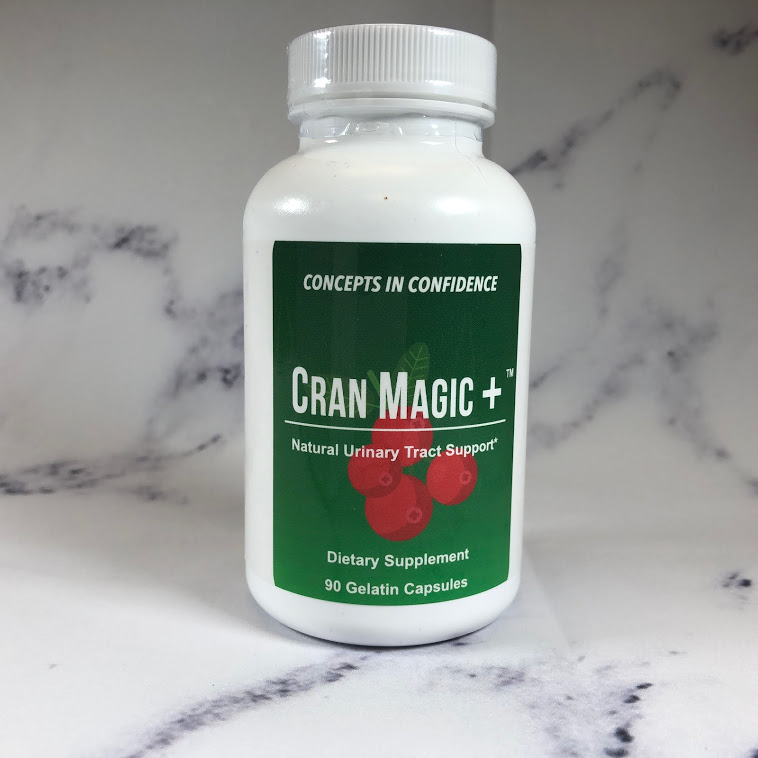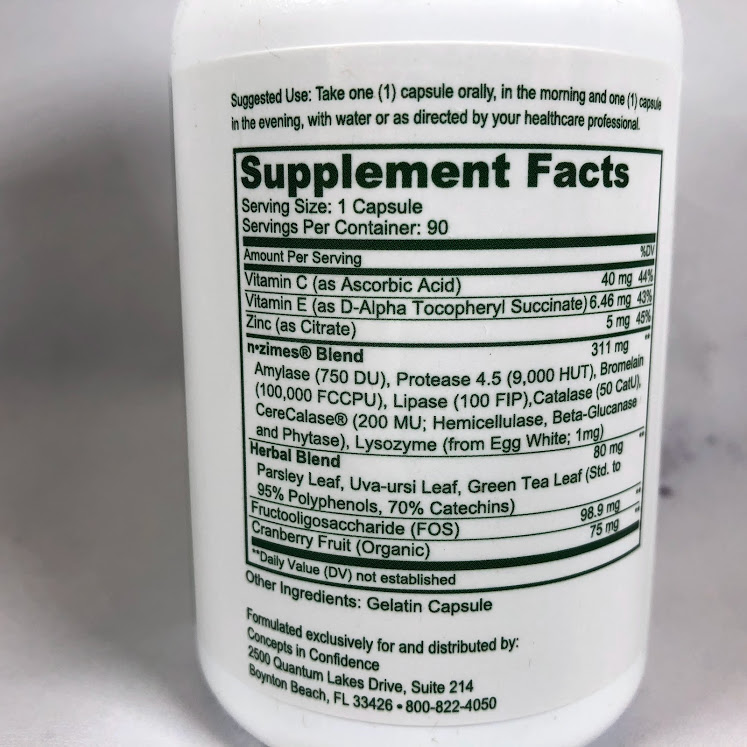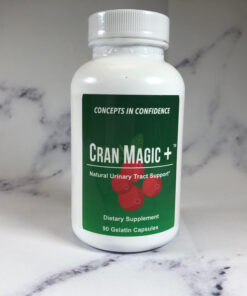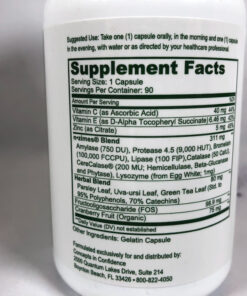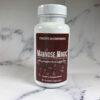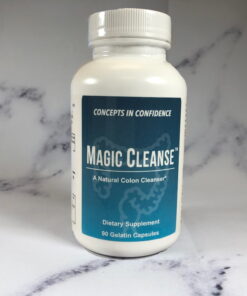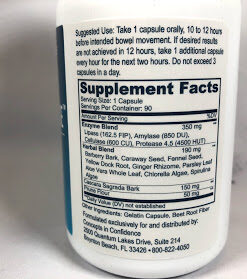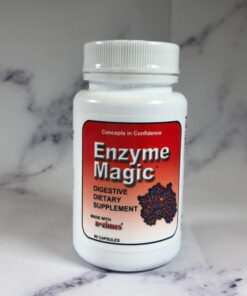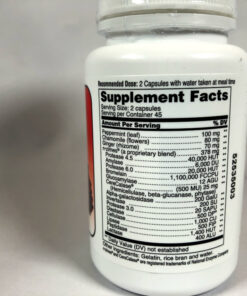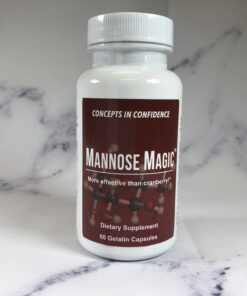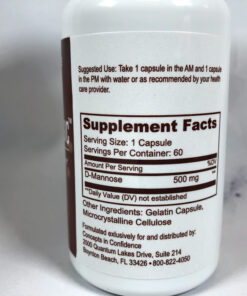Cran Magic – 1 Bottle of 90 Capsules
$22.95
Cran Magic – 1 Bottle of 90 Capsules
Cran Magic+ capsules have been developed using a blend of ingredients that when take together can promote the health of the bladder, the kidney and the entire urinary tract.This combination of cranberry, zinc, herbs, vitamins, and enzymes provide for anti-adherence properties, healing properties, immune system enhancement, and anti-inflamatory benefits.Cranberry has been specifically studied and found to contain phytochemicals known as proanthocyanidins, which help maintain healthy flora in the urinary tract. Cranberry also keeps the bacteria from sticking to the cells lining the urinary tract.
What are the ingredients and how do they benefit me?
INGREDIENTS: Cranberry fruit concentrate, Vitamin C, Vitamin E, Zinc, enzyme blend, Parsley leaf, Green Tea extract, and Uva-Ursi leaf
CRANBERRY:
A long history of folkloric use of this fruit juice for urinary tract infection has been supported by a continuous flow of studies. Initially researchers associated the effectiveness of cranberry with acidification of urine.
More current research indicates that this is not the mechanisms but rather that components of cranberry are able to inhibit bacterial adherence to cells of the urinary tract.
A recent study among college students showed significantly decreased occurrence of uti�s with daily consumption of cranberry juice. Currently, the active constituents remain unidentified.
Home health nurse 15(3); 198—202 (1997): nurse stand 9(34): 33�5 (1995); epidemiology 6(2): 162�8 (1995); jama 271:751� 4 (1994); j naturopathetic med 2(1):45�7 (1991); southwest med 47(1): 17�20 (1966); antimicrob agents chemother 33(1): 92�8 (1989); microbios 55: 173�81 (1988); j urol 131: 1013�6 (1984); nejm 324: 1599 (1991).
ANTIOXIDANT NUTRIENTS: (VITAMIN C, VITAMIN E, ZINC)
antioxidant supplementation is thought to improve immunity and thereby reduce infection. Extensive research has been done and continues to be done on the effectiveness of antioxidant nutrients in the prevention of infection. ARCH INTERN MED 159(7): 748�54 (1999).
VITAMIN C:
Clinical research has observed significantly decreased levels of ascorbic acid with infection. Studies indicate that bacterial infection may inhibit cellular uptake of ascorbic acid.
Supplementation has been shown to stimulate neutrophil motility and enhance phagocyte antimicrobial activity. In addition, certain bacterial infections show benefit when vitamin c is supplemented.
Furthermore, recent research indicates that vitamin c, particularly in combination with cranberry juice, may be effective as a prophylactic agent for urinary tract infection.
PROC SOC EXP BIOL MED 197(1): 128�31 (1985); MED HYPOTHESES 1:42�6 (1975); AM J EPIDEMIOL 132(1): 67�76 (1990); ADV NUTR RES 6:19�45 (1984); MED WORLD NEWS (12/28/87); MED J AUST 1(6): 169�74 (1974); J PHARM SCI 62(5): 837�8 (1973); CLIN EXP IMMUNOL 43(1): 180�8 (1981).
VITAMIN E:
Deficiency is associated with higher rates of infection. Supplementation has been shown to enhance humeral and cellular immune responses; increasing phagocytic functions.
Stinnett states that �almost every aspect of the immune system, including resistance to infection, specific antibody responses, splenic plaque forming cells, in vitro mitogenic responses of lymphocytes, res clearance, and phagocytic index, have been shown to be enhanced by modest increases in tocopherol [Vitamin e] intake.�
ANN NY ACAD SCI 570: 335�44 (1989); AM J PEDIATR HEMATOL ONCOL 1(1): 71�6 (1979); BR MED J 11/9/85 P1348—9; BLOOD 55:338 (1980); AM J CLIN NUTR 33: 606 (1980); J NUTR 110: 916 (1980).
ZINC:
Like vitamin c, serum levels of this nutrient have been shown to decrease rapidly during infection. Prolonged deficiencies of this mineral have been shown to depress t-cell function.
Studies link low levels of zinc with increased risk of infection. Recent research has shown that low-dose supplementation of zinc significantly improves the humeral response after vaccination in the elderly.
REV INFEC DIS 5(1): 137�47 (1983); EUR J PEDIATR 147(2): 179�83 (1988); EUR J PEDIATR 146(3): 293�95 (1987); AM J CLIN NUTR 41(6): 1220�35 (1985); ARCH INTERN MED 159(7): 748�54 (1999).
PARSLEY:
Diuretic, this herb is also considered to be a urinary disinfectant, helpful in mild inflammatory conditions of the urinary tract. Additionally, parsley is a rich source of beta-carotene, which has been shown to support the immune system.
This highly antioxidant compound is converted to vitamin a within the body. Vitamin a deficiency has been linked to increased susceptibility to infection. Supplemental vitamin a has been shown to enhance lymphocytic response to antigens.
Beta-carotene is photoprotective; uv exposure has been shown to induce immunosuppression, which can be prevented with beta-carotene supplementation. Furthermore, beta-carotene has been shown to directly impact immunity.
AM J CLIN NUTR 40:1090�95 (1984); AM J CLIN NUTR 35:417�68 (1982); LANCET 336:1349�51 (1990); BR MED J 1348�9 (10/9/85); MUTAT RES 192(1): 7�10 (1987); INT J CANCER 48(2):199�205 (1991); NUTR CANCER 12(1):93�101 (1989).
FOS:
Fructooligosaccharides (fos), the best-known probiotic, has been included to help support the growth of beneficial microorganisms. Probiotics consist of special nutritive factors which are not metabolized by the human system but instead provide nutritive support to the natural flora of the intestines.
The input of fermentable carbohydrates into the colon is of great importance to the colonic metabolism. Supplementing fos, which is fermentable by the bifidobacteria, can greatly increase the metabolic activity in the colon.
Studies have shown that fos supplementation can significantly increase the population of bifidobacteria in the colon, help relieve constipation, improve blood lipids in hyperlipidemia, and reduce production of intestinal putrefactive substances. in addition, fos has been shown to strongly inhibit growth of the pathnogenic bacteria clostridium perfringens. In this manner, fos has been shown to support a healthy immune system.
J NUTR 129 ( S 7): 1442S�5S (1999); EUR J CLIN NUTR 53 (1):1�7 (1999); AM J CLIN NUTR 45:1243�55 (1987); VET HUM TOXICOL 30(2): 104�7 (1988); BIFIDOBACTERIA MICROFLORIA 5(1):37�50 (1986); BIFIDOBACTERIA MICROFLORA 1(1):39�44 (1982).
GREEN TEA EXTRACT:
Rich in antioxidant polyphenols, this herb has been the subject of much research on its immune system effects. Green tea consumption has been associated with decreased incidence of infection and cancer. Consumption of this herb is also linked with increased activity of antioxidant enzymes such as glutathione peroxidase, catalase, and quinone reductase.
J NATL CANCER INST 85(13):1038�49 (1993); EUR J CANCER PREV 2(4): 4050�2 (1992); JPN J CLIN ONCOL 23(3): 186�90; BIOSCI BIOTECHNOL BIOCHEM 60(6): 1000�5 (19960.
UVA URSI:
Diurectic, this herb is also considered to be a urinary disinfectant, helpful in mild inflammatory conditions of the urinary tract. The disinfectant effects of this herb are attributed to iridroid substances.
INT UROL NEPHROL 26(5): 407�11 (1994); PHYTOTHERP RES 13(3): 222�5 (1999); PHARMAZIE 33(8): 536�7 (1978); PLANTA MED 18(1): 1�25 (1970).
RECOMMENDED DOSAGE:
2 to 4 capsules per day with plenty of water.
GENERAL REFERENCES: DUKE, J.A. THE GREEN PHARMACY [EMMAUS, PA: RODALE PRESS 1997]. STINNETT, J.D. NUTRITION AND THE IMMUNE RESPONSE. [BOCA RATON, FL: CRC PRESS, 1983]. WERBACH, M.R.; MURRAY, M.T. BOTANICAL INFLUENCES ON ILLNESS. [TARZANA, CA: THIRD LINE PRESS, 1994] WERBACH, M.R. NUTRITIONAL INFLUENCES ON ILLNESS, 2ND EDITION. [TARZANA, CA: THIRD LINE PRESS, 1993].
| Weight | 0.3 lbs |
|---|---|
| Dimensions | 5 × 1 × 2 in |
Related products
Bowel Care
Bowel Care
Magic Brand Supplements

